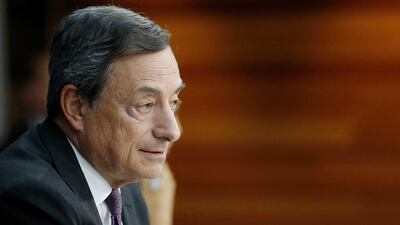The European Central Bank cut interest rates to an all-time low yesterday in a bid to ward off a Japan-style slump in the euro zone.
Two key rates were cut by 0.1 per cent each, with the refinancing rate falling to 0.05 per cent from 0.15 per cent, and the deposit rate falling from minus 0.1 per cent to minus 0.2 per cent. The ECB also announced an asset purchase programme.
While the rate cut lifted stocks and bonds in Europe and North America, it reduced the value of the euro against major currencies.
The euro fell below US$1.30 for the first time since July last year.
It also declined 0.8 per cent to ¥136.65, and fell as much as 0.2 per cent to 1.2044 Swiss francs, the lowest since November 2012.
The ECB president, Mario Draghi, cited “the overall subdued outlook for inflation, the weakening in the euro zone’s growth momentum … and the continued subdued monetary and credit dynamics” as the reasons for the surprise move.
Inflation and growth rates in Europe are hovering close to zero, with some economists drawing parallels with the beginnings of the decades-long recession that hit the Japanese economy in the 1990s.
The ECB is mandated to ensure that euro-zone inflation, currently at 0.3 per cent, falls at or below 2 per cent annually.
“As our measures work their way through to the economy, they will contribute to a return of inflation rates to levels closer to two per cent,” Mr Draghi said.
“Should it become necessary to further address risks of too-prolonged [below-target inflation], the [ECB] is unanimous in its commitment to using unconventional instruments within its mandate.”
Disagreement is likely to arise, however, over which measures fall within the ECB’s mandate.
The German Constitutional Court in February questioned the legality of the ECB’s government bond buying programme, also known as Outright Monetary Transactions, and could provide further opposition to a broader asset purchase programme.
“The surprise decision by the ECB to cut its main interest rates today looks like a stopgap ahead of more powerful stimulus measures to be unveiled in the coming months,” said Jonathan Loynes, the chief European economist at Capital Economics.
“The cuts reflect the further deterioration in the economic data in recent weeks and the fall in inflation to within a whisker of zero. At the margin, they may have some small positive effect on bank lending and activity and perhaps give the euro another downwards nudge,” he said. “But these moves are no substitute for the much more powerful policy action which looks increasingly necessary to prevent a renewed recession.”
Neither rate cuts nor the decision to introduce the asset purchasing scheme were unanimous, Mr Draghi said.
But he said that there was “comfortable majority” among the ECB’s board of national central bank chiefs in favour of introducing the asset purchase scheme.
“QE was discussed. Some of [the ECB board] were in favour of doing more than I’ve just presented, and some were in favour of doing less. So our proposal strikes the mid-road,” Mr Draghi said.
abouyamourn@thenational.ae
* with agencies
Follow The National's Business section on Twitter

